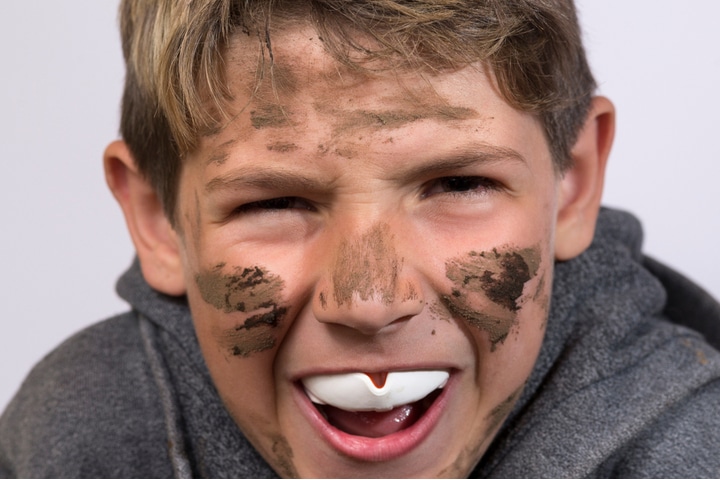
As a parent of two very active children I accept that accidents do happen! Even so, it is devastating to see a young individual who has damaged an adult tooth, knowing that it can potentially mean a lifetime of dental treatment.
What are the most common trauma injuries you see in the clinic?
Sporting injuries happen frequently, and of course, more often in contact sports. I commonly see trauma to the front teeth, including fractures of the crown, root and even complete avulsion (knocked out).
Are there certain sports that cause more injury than others?
Sports which can more commonly cause injury to your teeth include:
- AFL (Australian Rules Football)
- Rugby
- Hockey
- Any combat sports
- We also see many injuries around the swimming pool!
What are the key steps to take if your child has a tooth knocked out?
If your child has an accident involving their teeth, it is important to seek a dental assessment as soon as possible, and if it’s an adult tooth that is broken, changed position or been completely avulsed, consult with a dentist even more quickly! If there are any tooth fragments or an avulsed tooth, clean the tooth or fragment carefully. Remove any obvious debris, but do not rub the surface of the root. Store the tooth under the patient’s tongue or in their cheek (in other words, their own saliva), or in saline solution or milk. Do not place the tooth in water as this can cause damage.
How can parent’s best protect their children’s teeth?
Prevention is the best form of treatment. You can prevent trauma and limit the amount of damage by using a well-fitted sports mouthguard. There are two main types of mouthguards available: custom made and over-the-counter ‘boil and bite’.
Does a ‘boil and bite’ mouth guard sufficiently protect?
To answer this question, I decided to personally test the product. The boil and bite mouthguard I purchased was very loose and only retained by biting. If your child can easily flick their mouthguard in and out of their mouth, then there is insufficient retention. These guards can create a choking hazard, and won’t sufficiently protect the teeth.
What are the benefits of getting a bespoke mouth guard?
A well fitted mouthguard does not fall out when moving/running. It has an even thickness over all the surfaces of the teeth. When there is impact, the mouthguard acts to disperse the forces and pressure evenly over the mouth. This protects the point of impact (usually the front teeth) from taking the entire load. Subsequently there is far less trauma and damage.
I highly recommend getting a well fitted mouthguard made by a dentist. The cost will be more, but worth it in the long run!
 Dr Francine Chia is an Australia trained dentist based at Smilefocus. Dr Francine is passionate about protecting children’s teeth!
Dr Francine Chia is an Australia trained dentist based at Smilefocus. Dr Francine is passionate about protecting children’s teeth!
Call 6834 0877 to make an appointment.
